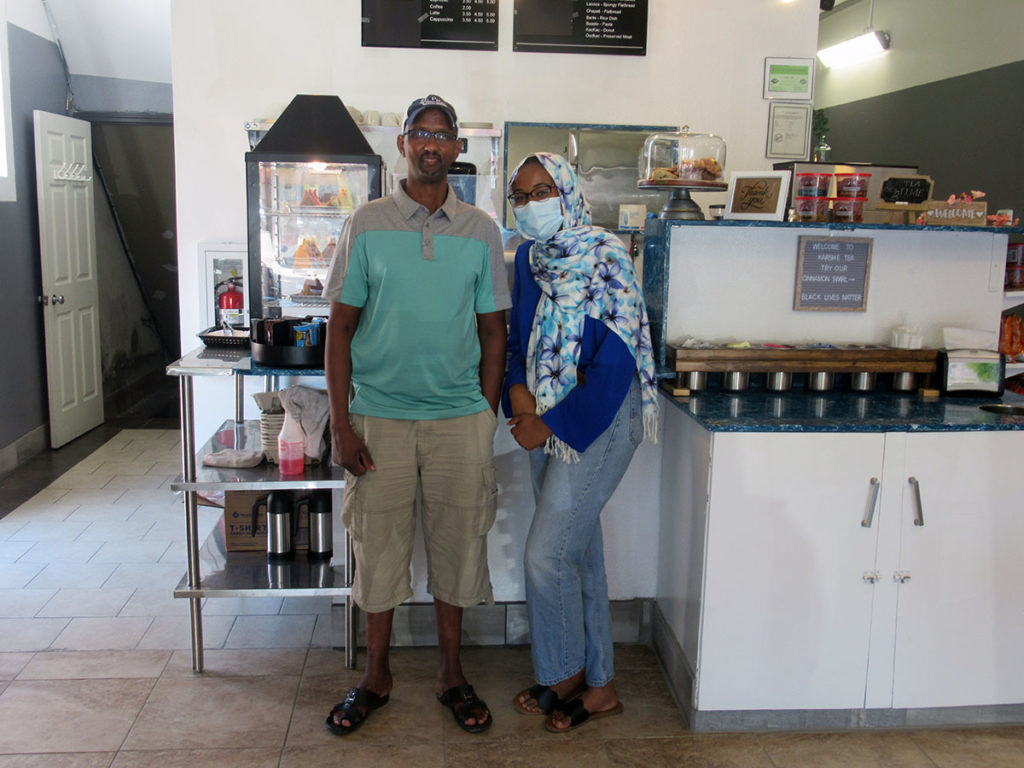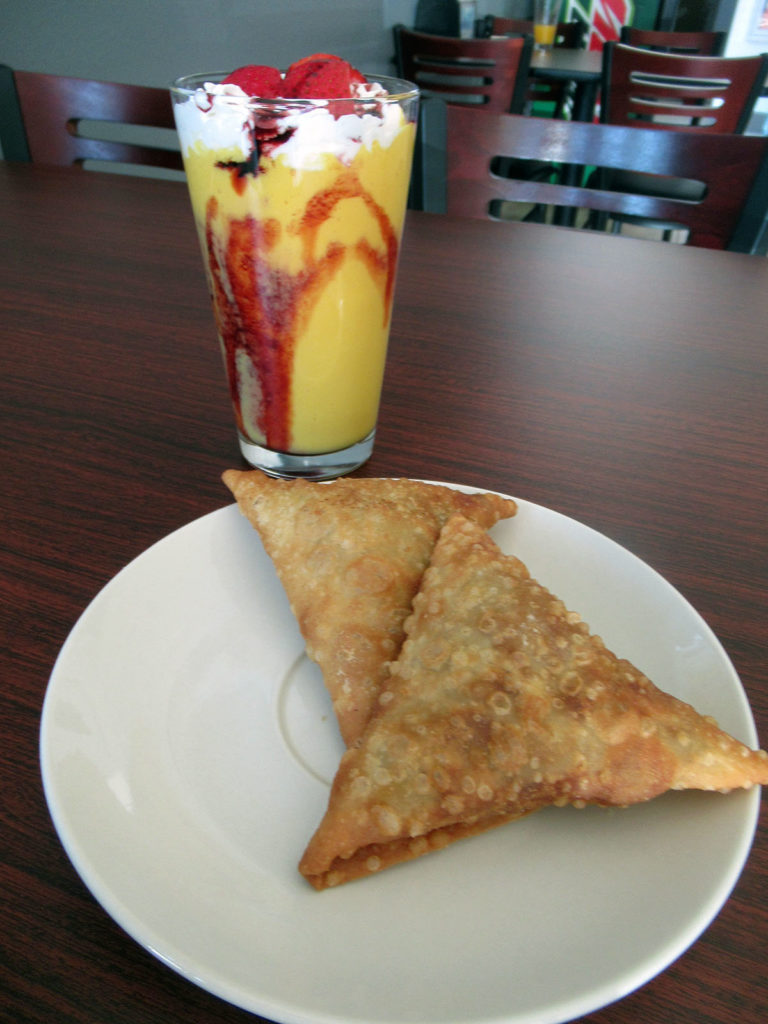Ever since Sami Ismail was a kid growing up in Somalia, he had a dream of opening his own business. He grew up in a family full of entrepreneurs, with relatives who owned multiple restaurants, boutiques, and grocery stores. But for Ismail, the road to opening his own business was full of quite a few unexpected turns—and a lot of hard work—before he was finally able to start Karshe Tea in downtown Mankato this June.
“[First], I built my family and grew up my kids,” said Ismail, a father of seven. “When you start a new life or a new business, you don’t know how long it’s going to take. I was going to wait until [my kids] grew up… It took 20 years!”
Years of Hard Work
Ismail grew up in Somalia but was forced to leave during the Somali Civil War, which took place in the early 1990s. He traveled through several African countries before settling in Yemen, where he had relatives. There, he met his wife, Leila, in 1993, and the two of them decided to immigrate to the United States. When they were about to leave, they learned that Leila was pregnant with their first child, Rahma, so Ismail went ahead, and Leila waited until she had given birth to their daughter to follow him.
Ismail first arrived in Marhsall, Minnesota and immediately started working to save up to buy tickets for his new, small family to join him. While he began working in the freezer section of production giant Turkey Valley Farms, he realized that the work was too cold for someone not used to Minnesota winters.
“I told [my supervisor] I needed a different job, and everyone said, ‘What? Somalis never quit! Are you crazy?’” Ismail recalled. “But I had to put my safety first. It was below zero [at work], and sometimes, I couldn’t move my fingers. I called the office and said, ‘I’m done.’ I was the first Somali to quit there.”

Ismail decided to move to southern Minnesota, where he had some family members. He arrived in St. Peter almost immediately after the infamous tornado of 1998, and he found a job cleaning up the city.
“Every morning, at 4:30 a.m., got in line to help clean garbage [and other wreckage],” Ismail said. “I was paid $6.50 an hour.”
Eventually, he saved up enough for Leila and Rahma to join him in late 1998, and he says they were the first Somali family to truly settle into St. Peter. For Ismail, though, settling down was a little harder, because he had found a new job at the Taylor Corporation in North Mankato, and he didn’t have a vehicle at the time. To deal with this, he would live with relatives in Mankato for his five days of shifts, then return to St. Peter to be with his family on his free days. The apartment where he stayed only had two rooms but more occupants, so Ismail slept on the floor, using his jacket as a blanket. He would walk to work—about six miles each way—before he was eventually able to afford a bicycle.
One day, a police officer stopped me, but I didn’t speak great English and he didn’t speak Somalian…. he said I didn’t have a safety light…. he took me to Walmart to buy a light and brought me home.Sami Ismail
“In the summer, I’d walk [to my shift at] 3 p.m.-11 p.m.,” Ismail said. “I’d put a sandwich in a backpack and walk over, until I bought a bike. One day, a police officer stopped me, but I didn’t speak great English and he didn’t speak Somalian. He was asking me about where I was going, and he said I didn’t have a safety light. He called someone who could talk to me in my language, and [then] he took me to Walmart to buy a light and brought me home.”
Ismail eventually switched jobs to work for Cambria in Le Sueur. Although he was offered a better-paying job in St. Cloud, he decided it would be too difficult for his family—which now included three children—to move to a new area and start over, so he stayed with Cambria. He has worked there for 20 years now, working his way up from an evening cleaner to a position higher up on the production side of things.
A Surprising Announcement
According to Ismail’s eldest daughter Rahma Abdi, who also works as his business manager, she and her siblings sensed that something big was coming in the fall of 2017 when her father often didn’t have to go to his usual work shift.
“Both my parents are very hard-working people,” Abdi explained. “There’s never been a time that they missed work, unless we had something for school, or we had a game or something. Those were the only two times they’d miss work. During the fall in 2017, no one [in our family] was doing any sports, so there was no reason for them to be home. But we were noticing that [our father] was home a lot, and we were all curious, but he’d come up with some excuse. Thanksgiving time came around, and that’s when he drops a bomb on us: ‘Oh, I took an early retirement. I decided to pursue my dream of opening a café.’ It was a shocker to all of us! I think he just went on a whim. He’s a very optimistic person.”
Abdi said that Ismail used his first year of early retirement to figure out what sort of business to start, how to go about opening it and what kind of resources were available to him. But Ismail ran into difficulties because area lenders weren’t interested in offering him loans. Instead, he had to start his business entirely from his savings, and he ended up returning to Cambria so that he would have more funds to support the café as it grew.
I’d definitely like to mention my mom. I think she’s the soul of our business. Literally nothing would be possible without her.Rahma Abdi
“During that time, it was really hard, because people really weren’t willing to give him a chance on it,” Abdi said. “Everything here is based off my parents’ paychecks and their savings. There are no loans to it at all.”
Ismail started renting a building on Front Street in Mankato in 2018, spending the next two years totally renovating the interior. He had to deal with surprise flooding in his basement shortly before he planned to open, which delayed his plans slightly. Then COVID-19 swept through and delayed his plans some more.

But, after years of hard work and preparation, Ismail was finally able to officially open Karshe Tea on June 12. Right now, only Ismail and his family work at his tea shop, with the kids helping around their school schedules.
“At the end of the day, a lot of my siblings were thinking, all our parents have done is sacrifice for us, so it’s the least we could do is be supportive,” she said. She added that she wanted to specifically thank her mother, Leila, for all her work in getting the tea shop started. “I’d definitely like to mention my mom. I think she’s the soul of our business. Literally nothing would be possible without her.”
Sharing Somali Culture
When it came to choosing what business to start, Abdi explained that her father chose a tea shop because tea is so important to Somali culture.
“In our Somali culture, tea brings people together,” she said. “In any social gathering, 100 percent, you can bet on it, tea is being served. And that’s how Somalis come together to socialize. If someone passes away, you’ll most likely bring tea over to the house.”
Karshe Tea’s name comes from another Somali tradition: nicknames.
“Within the Somali culture, you’re known by your nickname, and each nickname has a meaning for who the person is,” Abdi said.

She went on to explain that Karshe was the nickname of her great-grandfather, and it means a hard-headed, strong fighter. Meanwhile, Ismail’s father’s nickname was Aar, which means lion. To pay homage to this, Karshe’s logo is a close up of two feline eyes staring down at you. If you look a little closely, though, the cat’s face looks a bit off.
“The symbol actually is a tiger,” Abdi admitted with a chuckle. “The lion didn’t look that cool, so I chose a tiger, but it’s supposed to represent a lion.”

Right now, the menu consists of mostly teas, coffee drinks, smoothies and small breakfast items such as fruit, cinnamon rolls and banana bread. There are also sambusas, a traditional Somali pastry that’s stuffed with meat and vegetables, and chapati, a type of flat bread.
Eventually, once their kitchen is fully up and running, the family wants to expand their menu to traditional Somali breakfast and dinner offerings as well. Some dishes will include malawah, a sweet pancake that can be covered in everything from honey to tea, and Bariis, a rice dish that can incorporate ingredients such as goat meat. The hope is to be able to offer this expanded menu by the end of August.
“We’re trying to base it off culturally what we eat,” Abdi said. “Everything that we serve for breakfast is everything that we have culturally at home. A lot of the stuff, you have to get your fingers dirty to eat it. We eat with our hands. [Our hope is to offer many] things and different ways you can eat them, so that it’s not the same thing you’re eating all the time.”




